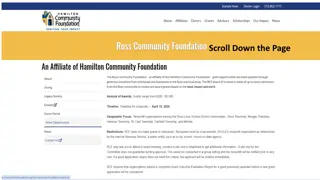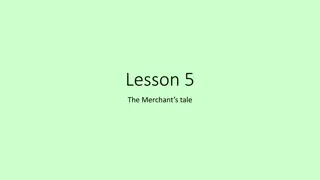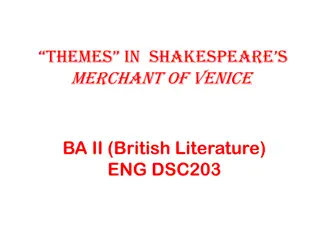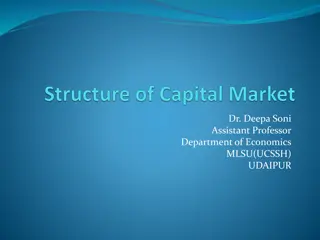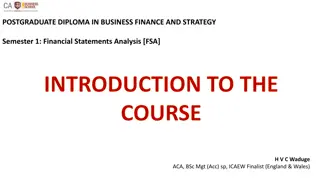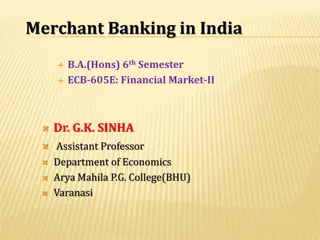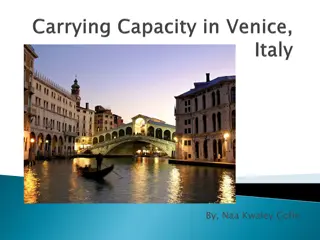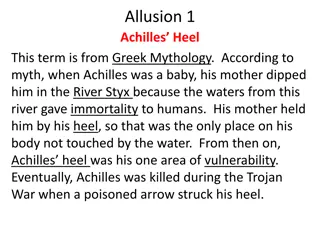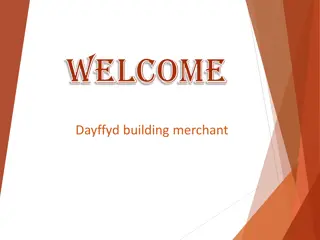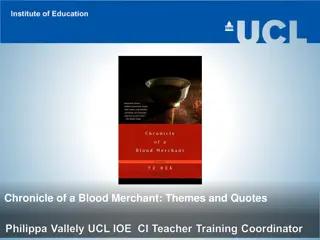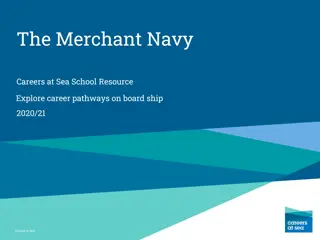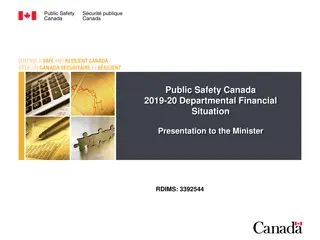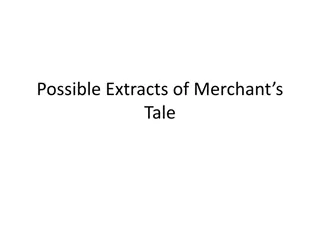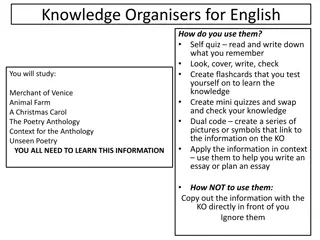Understanding Bassanio's Financial Situation in "The Merchant of Venice
Bassanio, a scholar and soldier, is a kinsman to Antonio and has lost his inherited wealth. To court Portia in Belmont, he needs money and turns to Antonio for a loan. This decision sets the stage for financial tensions and complex relationships in the play.
Download Presentation

Please find below an Image/Link to download the presentation.
The content on the website is provided AS IS for your information and personal use only. It may not be sold, licensed, or shared on other websites without obtaining consent from the author. Download presentation by click this link. If you encounter any issues during the download, it is possible that the publisher has removed the file from their server.
E N D
Presentation Transcript
LE2:LOs: Who is Bassanio? / Why does Bassanio need to borrow money from Antonio?
Recap questions: Recap questions: 1. What is a merchant? 2. Antonio is a merchant and this makes him wealthy. Why? 3. How do Salerio and Salanio try to cheer up a sad Antonio at the start of the play? 4. How do we know Antonio is not worried about his ships? 5. What is the difference between a literary device and a rhetorical device? Do it now
Who is Bassanio? Bassanio is a scholar and a soldier. He is also a kinsman to Antonio. New knowledge At the start of the play we learn that Bassanio has lost all of the money he inherited from his father. He has a real lack of concern about money. He asks Antonio to lend him some money so that he can travel to Belmont to a woo an heiress named Portia. When Antonio says he has no money because his money is at sea, he agrees to take out a loan from a usurer to help Bassanio out.
Who is Bassanio? In Act 1 Scene 1 of The Merchant of Venice we meet Bassanio when he comes to find Antonio. New knowledge Read through the extract from Act 1 Scene 1. On the left hand side, you have the Shakespearean English and on the right hand side, the modern equivalent.
Why is this scene important? Why is this scene important? - - Financial value Financial value Antonio is a merchant. We know he is rich at the start of the play because he has numerous ships grand ships, fast ships that are currently at sea trading; he has enough money that he could survive for a year if he lost his ships to a storm Bassanio is a scholar. We know he is poort at the start of the play because he admits to having spent his father s inheritance wildly; he has already borrowed money from Antonio; he has to ask his friend to lend him money New knowledge
Why is this scene important? Why is this scene important? Financial value Financial value Bassanio has come to persuade Antonio to lend him some money. In my school days, when I had lost one shaft, I shot his fellow of the self-same flight The self-same way with more advised watch, To find the other forth, and by adventuring both I oft found both . New knowledge Shakespeare draws upon a common feature of rhetoric and uses an extended metaphor to help Bassanio persuade Antonio to lend him the money. But if you please To shoot another arrow that self way Which you did shoot the first, I do not doubt, As I will watch the aim, or to find both Or bring your latter hazard back again Key questions: 1. What is the metaphor and how is it extended? 2. Why do you think Shakespeare uses an extended metaphor here? Why might it be more effective than having Bassanio ask for a loan outright? 3. What does this reveal about Bassanio s character?
Why is this scene important? Why is this scene important? The value of friendship The value of friendship SHAKESPEREAN ENGLISH: Within the eye of honour, be assured My purse, my person, my extremest means Lie all unlocked to your occasions. New knowledge MODERN ENGLISH: As long as it s honourable you can be sure that I ll let you use all my money and do everything I can to help you. Key questions: A tricolon is a list of three parallel clauses, phrases or words without interruption. 1. Where is a tricolon used in this speech? 2. What does the use of the tricolon suggest about the friendship between Antonio and Bassanio?
Why is this scene important? Why is this scene important? The value of friendship The value of friendship SHAKESPEREAN ENGLISH: And out of doubt you do me now more wrong In making question of my uttermost Than if you had made waste of all I have. New knowledge MODERN ENGLISH: All of this talk means you have doubts about my friendship. That s worse than if you bankrupted me. Key questions: 1. What does the word uttermost mean? 2. What is suggested about how Antonio values Bassanio s friendship here?
Why is this scene important? Why is this scene important? The value of friendship The value of friendship SHAKESPEREAN ENGLISH: Try what my credit can in Venice do, That shall be racked even to the uttermost To furnish thee to Belmont to fair Portia. Go presently enquire, and so will I, Where money is, and I no question make To have it of my trust or for my sake. MODERN ENGLISH: But go ahead and charge things to me on credit, as much credit as I can get in Venice. I ll use my lines of credit to help you get to Belmont, to Portia. Go see who will lend money, and I ll do the same. I m sure I can get something either as a business loan, or as a personal favour. New knowledge Key questions: An imperative is a command 1. What do the use of the imperatives go forth / try / go presently enquire reveal about Antonio s desire to help Bassanio? 2. The noun uttermost is repeated here. Why has Shakespeare repeated the use of this noun?
Why is this scene important? Why is this scene important? The value of friendship Emotionally intense friendships between men had a high social status. One writer from the same time as Shakespeare described a faithful friend as an alter ego, that is another himself. The value of friendship New knowledge This explains Antonio s self-sacrificing, generosity to his friends. Recent critics have suggested that Antonio is in love with Bassanio. Despite being illegal, romantic love between men was a feature of the Elizbethan period too, and among his sonnets Shakespeare wrote a number of love poems to an adored young man. It may be that Antonio s sadness at the beginning of the play is bound up with a sense that in his society he cannot have what he truly wants.
Why is this scene important? Why is this scene important? Bassanio s Bassanio sview on Portia s value view on Portia s value MODERN ENGLISH: There s a girl in Belmont who s inherited a huge amount of money, and she s beautiful and even better she s a good person. I think she likes me. Sometimes the expression on her face tells me she likes me. Her name is Portia. She s as rich as that famous Roman heroine Portia, the daughter of Cato and wife of Brutus. Her wealth is world-famous. Famous and important men have come in from all over the world to try to marry her. The hair that hangs down on her forehead is like gold, calling every adventurer to Belmont like a gold rush. Antonio, if I only had enough money to hold me own against those suitors, I know I could win her. SHAKESPEREAN ENGLISH: In Belmont is a lady richly left, And she is fair, and fairer that word Of wondrous virtues. Sometimes from her eyes I did receive fair speechless messages. Her name is Portia, nothing undervalued To Cato s daughter, Brutus Portia. Nor is the wide world ignorant of her worth; For the four winds blow in from every coast Renowned suitors, and her sunny locks Hang on her temples like a golden fleece, Which makes her seat of Belmont Colchos strand, And many Jasons come in quest of her. O my Antonio, had I but the means To hold a rival place with one of them, I have a mind presages me such thrift That I should questionless be fortunate. New knowledge
Why is this scene important? Why is this scene important? Bassanio s Bassanio sview on Portia s value view on Portia s value SHAKESPEREAN ENGLISH: In Belmont is a lady richly left, And she is fair, and fairer that word Of wondrous virtues. Sometimes from her eyes New knowledge MODERN ENGLISH: There s a girl in Belmont who s inherited a huge amount of money, and she s beautiful and even better she s a good person. Key questions: 1. Consider the order in which Bassanio presents Portia to Antonio. What seemingly does he value about her the most? 2. What do the dashes suggest?
Why is this scene important? Why is this scene important? Bassanio s Bassanio sview on Portia s value view on Portia s value The art of rhetoric: the use of allusion. New knowledge An allusion is a brief indirect reference to a person, place, thing or idea of historical, cultural, literary or political significance. When Bassanio is talking about Portia and describing her to Antonio, Shakespeare uses two allusions to give Antonio and us, the audience, some sense of her character.
Why is this scene important? Why is this scene important? Bassanio s Bassanio sview on Portia s value view on Portia s value ALLUSION 2: SHAKESPEAREAN ENGLISH: Her name is Portia, nothing undervalued To Cato s daughter, Brutus Portia. MODERN ENGLISH: Her name is Portia. She s as rich as that famous Roman heroine Portia, the daughter of Cato and wife of Brutus. New knowledge A classical reference is made here. Cato and Brutus were influential politicians in ancient Rome. Portia (Cato s daughter) was Brutus s, who was seen as honourable, second wife. In addition, The Portia depicted in Julius Caesar, Porcia Catonis, wife of Marcus Brutus is not a chief character in the play, but she displays very strong qualities of loyalty, character, love and obedience. She is deeply in love with her husband and is offended when he, at first refuses to confide in her about what is troubling him. To convince Brutus of her loyalty and trust, she stabs herself in the thigh, displaying rare strength and conviction. Brutus is impressed by her remarkable resolve and thus reveals to her the plot to assassinate Caesar. True to her promise, Portia never betrays Brutus. An educated audience would understand this reference but in also using this reference the audience learn that Bassanio is educated himself.
Why is this scene important? Why is this scene important? Bassanio s Bassanio sview on Portia s value view on Portia s value ALLUSION 2: SHAKESPEREAN ENGLISH: Nor is the wide world ignorant of her worth; For the four winds blow in from every coast Renowned suitors, and her sunny locks Hang on her temples like a golden fleece, Which makes her seat of Belmont Colchos strand, And many Jasons come in quest of her. MODERN ENGLISH: Her wealth is world-famous. Famous and important men have come in from all over the world to try to marry her. The hair that hangs down on her forehead is like gold, calling every adventurer to Belmont like a gold rush. New knowledge A mythological reference is made here. The reference is to the Golden Fleece, which the Greek hero, Jason, sought in Colchis. The golden fleece is the golden coat of a Boeotian ram. It was rumored to be the most magnificent item that even mighty kings envied. After the parents of Jason, the rightful prince of Thessaly, died, his power hungry uncle assumed the throne. Years later when Jason returned to claim the throne he made a deal with his uncle that if he was able to find the golden fleece, he may have the throne.
Why is this scene important? Why is this scene important? Bassanio s Bassanio sview on Portia s value view on Portia s value Key questions: New knowledge Allusion 1: a classical reference to Portia, Cato s daughter and Brutus s wife. Allusion 2: a greek mythological reference to Jason and his quest for the Golden Fleece. Consider both of these allusion, why do you think Shakespeare drew upon both of these allusions? How do they help Shakespeare, and Bassanio, to present the character of Portia to Antonio and the audience?
Now having considered Act 1 Scene 1 in its entirety, do you think Antonio should lend Bassanio the money he has requested? Reflection Ensure you support your opinion with evidence from the text.




